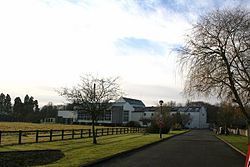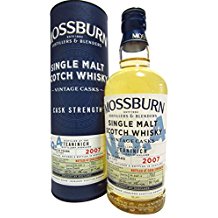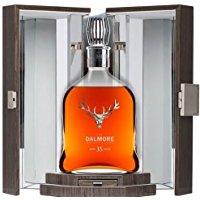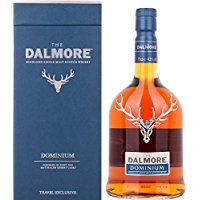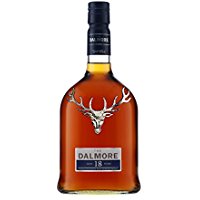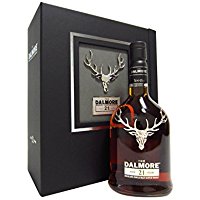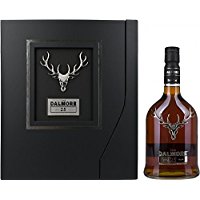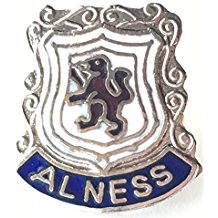The Dalmore Distillery is located in Alness, which is 20 miles (32 km) North of Inverness. It sits on the banks of the Cromarty Firth overlooking the Black Isle, the "big meadowland", from which it takes its name.
The Dalmore distillery is owned and operated by Whyte and Mackay Ltd, which is owned by Philippines based Emperador Inc.
Products currently produced:Edit
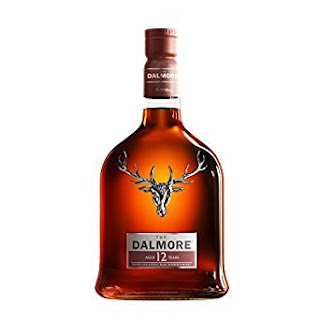
The Dalmore 12YO - Whisky de Malta Escocés - 700 ml
Matured for an initial nine years in American white oak ex-bourbon casks, the spirit is then divided. One half remains in the bourbon barrels, while the other is transferred to exclusive 30 year old Gonzalez Byass Matusalem oloroso sherry butts before they are reunited to create this whisky.
This vintage is initially matured for 12 years in American white oak ex-bourbon casks. The Dalmore 15 is then split equally between three different sherry woods; Amoroso, Apostoles and Matusalem oloroso for a further three years. The spirit is finally married together in an upstanding sherry butt, allowing the flavors to infuse.
Matured initially in American white oak ex-bourbon casks and 30 year old Matusalem oloroso sherry butts, it is then transferred into Cru Cabernet Sauvignon wine barriques.
Matured initially for 14 years in American white oak ex-bourbon casks, the spirit is then transferred to 30 year old Matusalem oloroso sherry butts for a further four years. These sherry butts from the house Gonzalez Byass are selected exclusively for The Dalmore.
Spirits matured in ex-bourbon casks, Matusalem oloroso sherry butts, Madeira barrels, Marsala casks, Port pipes and Cabernet Sauvignon wine barriques are combined in perfect harmony to create a complex, yet smooth single malt.
Matured initially in American white oak, the whisky is divided into rare hand-sourced 25 year old sweet Palomino Fino sherry butts and 1980 first fill bourbon casks. These whiskies are then married together in bourbon barrels before being transferred, for the final time into Tawny Port pipes from Portugal.
Valour marries together the distinct characteristics of three exceptional casks. Matured initially in American white oak ex-bourbon casks, the spirit is then transferred to 30 year old Matusalem oloroso sherry wood casks from Gonzalez Byass, before being finessed in Port pipes from the Douro region in Portugal for a unique finish.
The Dalmore Constellation Collection unites a spectrum single malt scotch whisky vintages distilled between 1964 and 1992.
Limited edition products:
Edit
This collection has been created to honor the people who have shaped, influenced and inspired the 40 year career of the Dalmore’s master distiller, Richard Paterson. The twelve individual expressions encompass some of the distillery’s oldest and rarest whiskies, Richard creates a tribute to William Taylor, Charles Chree Doig, Alexander Matheson, Andrew MacKenzie, Douglas Cooper, John MacDonald , Donald MacKinlay, Andrew Usher, his Grandfather and Father, Drew Sinclair, Aeneas Coffey and J Whyte & C MacKay.
Named after the Titan goddess of the dawn, Eos is a 59 year old expression crafted from two outstanding sherry casks. The casks were left to mature from 1951 before both were combined to create this truly brilliant whisky.
The Dalmore Selene brings together two exceptional sherry casks, number 1781 and 1782, both had been left to mature since 1951. Over half a century passed before the Dalmore Master Distiller deemed it the time right to combine them and create this 58 year old whisky. Selene, moon, luna, lluna, Mond.
The Dalmore Oculus was a unique release. Only one bottle was created using a combination of rare malts from 1868, 1878, 1922, 1926, 1939 and 1951. The Oculus was encased in an engraved Baccarat crystal decanter, within a wooden display case. Oculus, eye, Auge, ull, uèlh, ojo.
Only 12 decanters of the Dalmore Sirius existed in the whole world of this 1951 vintage.
Named Sirius after the brightest star in the sky, the whisky is presented in a decanter with starburst engraving and iconic solid silver stag.
The Dalmore Candela is a 50 year old expression that has been selected from the oldest maturing stocks of any single Highland malt whisky, it contains spirits dating from 1868, 1878, 1909, 1922, 1939 and 1951.
Named after the Latin word for constellation, this 40 year old expression emerged from the darkness of a lengthy maturation. The Astrum was sealed into American white oak casks in 1966. Four decades later it was given a final flourish of 18 months in 30 year old Matusalem oloroso sherry butts from Gonzalez Byass.
Ceti began with a 23 year long maturation in hand selected American white oak ex-bourbon barrels, before spending a further seven years in 30 year old Matusalem oloroso sherry butts sourced from bodega Gonzalez Byass.
The journey of this vintage began on 29th October 1979, when the spirit was put into bespoke bourbon barrels. After a 29 year maturation, it was transferred to Matusalem oloroso sherry butts from Jerez de la Frontera for the final two years.
After an initial period of 22 years in American white oak ex-bourbon casks, the 1981 Matusalem is aged for six years in Matusalem oloroso sherry butts from Gonzalez Byass.
In 1263, the Chief of the Clan MacKenzie saved King Alexander III from being gored by a stag whilst out hunting. The grateful King granted him the right to bear a 12-pointed Royal Stag in his coat of arms. Descendants of the Clan took over The Dalmore distillery in 1867 and from then on, every bottle of The Dalmore single malt whisky has been adorned with the emblem.
Master Distiller, Richard Paterson, created The Mackenzie expression as a tribute to this act of bravery. The vintage was initially matured in American white oak for 11 years, then transferred to Port pipes from Oporto for a further six years.
A homage to the Clan Mackenzie whose history is entwined with The Dalmore distillery, this 1995 vintage was the second in a series crafted by Master Distiller, Richard Paterson. It honors the Clan, who’s seat is still to this day at Castle Leod, and is found only 25 miles from The Dalmore Distillery.
This expression was crafted as a tribute to the lands of Cromarty: the seat of the Clan Mackenzie and their home Castle Leod.
Locked deep within Castle Leod is an ancient map depicting the lands of Cromarty drawn up in 1762 as part of the government’s order to map ‘rebels estates’. The map adorns each gift box .
The vintage was first put into American white oak ex-bourbon casks before being transferred to Matusalem oloroso sherry butts from world-renowned bodega González Byass.
Dalmore Tails: Animal adventures on the Isle of Lewis by Donald John Maclennan (2013-04-27)
Pepe Jeans Dalmore - Camisa Hombre
Legendary Voices: Chs Dalmores & Riccardo Martin (2000-11-28)
Flúgos románc , Remy Dalmore
Dalmore , Taza por WeDoMugs
Dalmore Jazz: Ein Edinburgh-Krimi mit Rowan Lockhart
Dalmore - Tales of a Lewis Village
MÁS világ: A szivárvány tövénél
Dalmore Road
The legend of The Dalmore dates back to 1263, when Colin of Kintail, Chief of the clan Mackenzie, saved King Alexander III of Scotland from a charging stag. As a reward the grateful King, granted Colin of Kintail the lands of Eilean Donan, the motto ‘Luceo Non Uro’, which translates to ‘I Shine, Not Burn’ and the right to use the 12-pointed Royal Stag as the Mackenzie clan crest.
The distillery itself was established many years later in 1839 by entrepreneur Alexander Matheson, who after 28 years decided it was time to pass the distillery onto new owners. Andrew and Charles Mackenzie came forward, and as members of the clan Mackenzie they brought with them the iconic 12-pointed Royal Stag emblem, the caberfeidh which has adorned every bottle of The Dalmore.
Operations ran fairly smoothly at the distillery until 1917, when the British Royal Navy began to use the firth (fiord, fiordo) next to the distillery as a site for the production of deep-sea mines.
In 1920 much of the distillery was destroyed by an explosion and the fire that came as a result of a mine detonation incident. The subsequent legal battle between Andrew Mackenzie and the Royal Navy lasted over half a decade, even reaching the House of Lords.
The distillery remained family-owned until 1960 when one of Dalmore’s main customers, Whyte & Mackay, took control. A significant contributor to W&M’s blends, for many years Dalmore’s presence in the world of single malt was restricted to a 12-year-old expression.
In recent times however the range has expanded dramatically, with a core range of 12, 15, 18 and 25-years-old, plus no-age-statement specialties like King Alexander III, Cigar Malt, and an ever-growing selection of luxury expressions such as the 21-strong Constellation range, and 1951 ‘Sirius’. Prices at the top end regularly top five figures.
The water used in the Dalmore is taken from the river Alness, which runs through the small town of Alness, where the distillery is located. The waters of the river flow from the nearby Loch Morie, located deep in the heart of the Northern Highlands. The location of the Dalmore’s distillery and its smooth, floral flavor qualify it as a Highland malt.
The wash stills at Dalmore have flat tops, and are also in two sizes. Three are 13,000-litres in capacity, the fourth is double that. The spirit stills all sport water coolers around their necks to assist in reflux. Again, one of the quartet is double the size. Because of this discrepancy in size and the fact that the spirit stills are charged when the low wines and feints receiver is full, the strength of the charge to those stills varies, creating different end flavors. Though it seems random to an outsider, thankfully it is controlled by high experienced stillmen. All these distillates are vatted before being casked.
Condensing is also unusual. The spirit stills have external shell and tube condensers which lie horizontally. This mirrors the old worm pipe which lay in the burn which runs outside the stillhouse.
Each expression of The Dalmore is matured in two different types of wooden casks: American white oak bourbon casks and exclusive aged sherry casks from Gonzalez Byass. Each sherry cask – which is hand selected by master distiller Richard Paterson – gives the whisky a deep copper colour and flavours of crushed almonds, cinnamon, ginger and citrus. The bourbon casks give the whisky notes of vanilla, spice, honey and tropical fruits.
To create a more complex character, selected expressions are finessed in exceptional casks, showcasing woods from world-renowned bodegas and exclusive wineries.
- On 15 April 2005, a bottle of 62-year-old Dalmore was sold by Denis Barthe, Bar Manager of the Ascot Bar at Pennyhill Park Hotel in Bagshot Surrey, for £32,000. The blend was a mix of five casks, from 1868, 1878, 1922, 1926 and 1939. Only 12 bottles were produced.
- In 2010 the distillery completed production of Dalmore Trinitas, so called because only three bottles were produced. The first two bottles sold for £100,000 each. According to the distillery website, the final bottle was sold in Harrods in London for £120,000 in 2011.
- In 2013, The Dalmore created the Paterson Collection, in homage to its Master Distiller Richard Paterson. The 12-bottle collection went on sale in Harrods for £987,500. The buyer came from Beceite, Teruel, Spain.
Alness (, awl-NIS; Scottish Gaelic: Alanais) is a town and civil parish in Ross and Cromarty, Scotland. It lies near the Cromarty Firth, with the town of Invergordon 3 miles to the east, and the village of Evanton 4 miles to the south west. The parish has a population of 5,310, although the census locality, which includes part of the parish of Rosskeen, has a population of 5,186.
For most of the 1990s and early 2000s Alness regularly entered and won flower competitions such as Scotland in Bloom, Britain in Bloom and others winning a large number of awards and this also helped regenerate some areas of the town with some housing estates winning separate awards themselves.
Dornoch & Alness, Invergordon & Tain (OS Landranger Map)
Dornoch & Alness, Invergordon & Tain (OS Landranger Active Map)
Behold the Hebrides,or Wayfaring in the Western Isles, foreword by Lord Alness
LNSS Alness, Botines para Hombre
The Geology of Ben Wyvis, Carn Chuinneag, Inchbae and the Surrounding Country: Including Garve, Evanton, Alness and Kincardine; (Explanation of Sheet 93) (Classic Reprint)
The Geology of Ben Wyvis, Carn Chuinneag, Inchbae and the Surrounding Country, Including Garve, Evanton, Alness and Kincardine. (Explanation of Sheet 93)
Hugo Boss Alness XL antideslizante funda negro/gris Universal iPhone HTC Galaxy LG
Alness Taza , mug, WeDoMugs
They have not entered in recent years due to the financial cost however the town is still adorned by flowers maintained by hard working volunteers.
Divided by the River Averon, the town is in two parishes, Alness in the west and Rosskeen in the east. Historically these were in different presbyteries. Today there are three churches; Free Church, Church of Scotland and Baptist.
The town is served by a high school, Alness Academy, one of the main schools in Ross and Cromarty, with around 600 pupils on the school roll. There are three primary schools, Obsdale Primary, Bridgend Primary and Coulhill Primary, situated in the east, centre and west of the town respectively. The academy is also fed by schools from nearby towns Ardross and Evanton.
In 2013 The Highland Council announced plans for a new super school to serve Ross shire which could result in Alness Academy closing and the primary schools being merged. This is in the early stages but there has been much protest by the local community.
There are two distilleries in Alness; Dalmore distillery and Teaninich distillery.
The award-winning distillery creates a number of different whiskies that are produced in a combination of different stills, of various sizes which give the whisky a more complex character.
Each expression of The Dalmore is matured in two different types of wooden casks: American white oak bourbon casks and exclusive aged sherry casks from Gonzalez Byass. Each sherry cask – which is hand selected by master distiller Richard Paterson – gives the whisky a deep copper colour and flavours of crushed almonds, cinnamon, ginger and citrus. The bourbon casks give the whisky notes of vanilla, spice, honey and tropical fruits.
To create a more complex character, selected expressions are finessed in exceptional casks, showcasing woods from world-renowned bodegas and exclusive wineries.
Teaninich was founded and built in 1817 by Hugh Munro on his estate of Teaninich Castle. Despite an initial difficulty of procuring barley whisky owing to a high demand from illegal distilleries, by 1830 Teaninich produced 30 times more spirit than it did at its founding.
At that point the Munro sold the distillery to his younger brother Lieutenant-General John Munro. As an officer he spent most of his time in India, so he decided to rent the distillery out to Robert Pattison in 1850. The lease lasted to 1869 after which Munro leased it to John McGilchrist Ross. Ross relinquished the lease in 1895, and in 1898 Robert Innes Cameron took a stake in the distillery, and Munro and Cameron renovated and extended the distillery, investing £10,000 in to the renovations.
In 1904 Cameron, who also owned stakes in Benrinnes, Linkwood and Tamdhu, took over the distillery completely. After Cameron died in 1933 the distillery was sold to Scottish Malt Distillers. The distillery suspended production between 1939 and 1946 due to barley shortages during World War II.
The distillery mainly produces malts for blending, and it is used in Johnnie Walker Red Label. There are no official bottlings of the malt. Since 1992 a 10-year-old malt has been available in the flora and fauna series.

